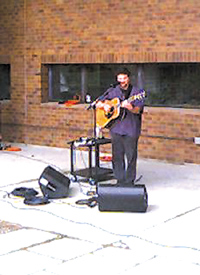Tripp Takes Journey
March 6, 2002
The journey down the path of life has been anything but smooth for Julia Tripp. There’s been some detours, and there’s been some wrong turns, as she traveled from being homeless to being recognized and honored for her contributions towards aiding others who are struggling along the same route.
The recognition of Tripp’s efforts has come in a number of forms in recent weeks. On February 5, Boston Mayor Thomas M. Menino presented her with a “Boston Neighborhood Fellows Award.” On February 27, she received a “Heroes Among Us Award” from the Boston Celtics. And on March 6, the Massachusetts Coalition on Homelessness chose a song she has written, “Bring America Home”, to inspire the participants in a demonstration at the Massachusetts State House to protest cuts in funding to programs for poor people.
“It’s an honor to be recognized for work I felt was being done anonymously. I’m really pleased,” said Tripp, who has worked for the last four and a half years as a consultant with the Center for Social Policy at UMass Boston’s McCormack Institute.
Tripp’s current focus at the center is on consumer issues. She trains shelter case managers in privacy issues, and is assisting in the development of a statewide homeless service data system. “When I look at my achievements I can look specifically at what the McCormack Institute is doing and the way it has manifested itself in support of my efforts,” she stated.
“Julia approached each of her activities fearlessly and with clarity, intelligence, and a sense of humor,” wrote her anonymous nominator for the Boston Neighborhood Fellows Award. “When she makes a decision to carry out a responsibility, she fulfills her commitment. She holds herself to high standards. Julia’s unrelenting and irrepressible drive to make a difference in ending homelessness and empowering those who have been directly affected by illness, the grip of addiction, and extreme poverty is beyond anything I have witnessed with any colleague.”
The Boston Neighborhoods Fellows Award is presented “in recognition of the power of the individual to make a difference.” The $30,000, no strings, cash award was presented by Mayor Menino to six Boston residents in recognition of their vision, creativity, leadership and commitment to fellow human beings.
The “Fellows” are generally those who receive little recognition for their services and go way beyond their job description. The award comes to the winners out of the blue. A phone call from the Philanthropic Initiative informs them that they have won the $30,000 for their behind the scenes work.
The donor of these cash awards remains anonymous. This year (2002) marks the 12th year of the “Fellows” program. Over the past 12 years, $1.5 million has been given to 73 Bostonians.
Tripp’s “Heroes Among Us Award” also came out of the blue. While attending a Boston Celtics game on February 27, during a break in the game in the second quarter the announcer introduced her and she was escorted to center court to receive the award. “It was such a surprise when they called my name,” explained Tripp. “They pulled my onto the court, told a piece of my story to 17,000 people, took my picture with Antoine Walker and gave me an awesome plaque with the Celtics logo.”
The award from the Celtics was in recognition of her volunteer leadership efforts to create a consumer manual for the city’s human services system, her role in creating a self-advocacy training module for persons in homeless shelters and her efforts to educate the public as frequent speaker about homelessness issues. She is also a member of the Boston Living Center’s speaking group that addresses public school students about HIV/AIDS.
” ‘Bring America Home’ is a song I wrote to inspire and motivate people who have never marched or held a picket sign,” explained Tripp. The song was performed in the Nurses Hall at the State House on March 6 before demonstrators met with legislators to protest cuts in human services funding. The song and performance piece has Tripp going into a park in Washington D.C. to tell a group of homeless people her story and they respond by marching on Capitol Hill.
Julia Tripp was homeless for 11 years. It was no doubt an arduous journey to get where is today. She now works actively and energetically to help others understand the obstacles and opportunities shelter guests face on their own journey. She is seen as a leader and inspiration by homeless people and is admired by service providers for her refusal to dwell on her own life and her dedication to others.





















































